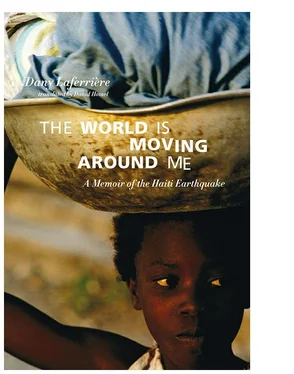The Hôtel Montana
Police are blocking the road to make way for an enormous crane that is trying to reach the Hôtel Montana perched on the top of a steep slope. A man running with sweat and covered in dust comes up to the passenger side of the car. I scarcely recognize the director of the Institut français who impressed me with his passion for turning young people into readers. Now he is part of the rescue team working on the hotel up ahead. I stayed there at the beginning of December. I can scarcely imagine the disaster. All this effort to save the Montana, while right next to it people are pleading for help. Is it to bury the dead or save lives? I have no idea. A man standing next to the car remarks, without too much bitterness, that there’s more here than the Montana. But it’s the place where big contracts are negotiated and important political decisions made. The favorite hotel of the international stars who have gotten interested in human misery. Humanitarian organizations send their people to stay there. And since most journalists (especially the ones from TV) have made the place their headquarters for years, you can imagine the enormous coverage the Montana is enjoying. It’s true, there are a lot of dead (and a few survivors) in the ruins of the hotel that collapsed in the first few seconds. The crane that was blocking traffic has finally started climbing toward the top of the slope, and we’re waved through.
How Georges Died
There are cars in the supermarket parking lot. A dozen or so. We pull into a space. Inside, complete chaos. In the liquor section, half the bottles are on the floor. We walk on broken glass through a pond of red wine. The shelves are nearly empty. Saint-Éloi manages to get his hands on a few cans of sardines. We pick up a dozen bottles of water. People are chatting in line. No electricity: the clerk is concentrating on his little pad of paper as he tallies up the bills. Behind me, an overwrought photographer is announcing the death of Georges and Mireille Anglade. I saw them last night at the hotel where they were attending a private reception. Always that mischievous look in Georges’ eye. Such warmth in the way he opens his arms to welcome you. Mireille waits patiently for Georges to finish crushing you against his chest by way of embrace. She is more delicate, with more nuances of feeling, but just as warm. A riddle of a smile. As always, Anglade was laughing, and every inch of flesh on his body danced. These last years, he had put all his energy into promoting the lodyans , the narrative form nearest, he maintained, to our way of seeing the world. He believed that Haitians are born storytellers who nowadays express themselves through writing. Recently he reread a good amount of our fiction (“from Independence to the present,” in his bulimic fashion) and discovered that our best writers are nocturnal storytellers. Our writing has its wellspring in that orality — that “oralature,” as he liked to call it. Georges was exaggerating, of course, but with such a good heart. The man had a kind of energy that could sweep you along like a wave. He loved endless discussions at the dinner table with good friends. A geographer who was also a politician, his true passion was literature. An incorrigible dreamer — that’s what he was. I can’t imagine him without Mireille. They died together.
The Sad-Eyed Young Man
Standing near the fence by the tennis courts, I see Chantal Guy come up. She’s a journalist with the Montreal daily La Presse , and Ivanoh Demers, the photographer, is right behind her. They’re both alive, and now they’re inseparable. When I was lying in the hotel courtyard with everything moving around me, I thought of Chantal Guy. I’d insisted so much that she come here, even though she had her doubts. It’s always difficult to convince people to come to Haiti. First they agree, because the country exerts a fascination. An intense exchange of letters follows, then silence. Friends and relations recommend against the trip. They go on Internet sites that portray an extremely dangerous place. Panic sets in. In the end, the answer is no. With Chantal, I did more than insist: I argued against each of her objections. For me, it was important for this delegation of Quebec writers to be accompanied by a good journalist. Besides, she’s a friend. I’ve been living in Quebec for thirty-four years, I know everyone on the literary scene, I’ve read most writers working today, and I felt it was time that Quebec writers come and see how Haitians live in their own country. I don’t think it’s healthy to have a good friend who knows you so well, who has looked into the hidden zones of your life, but who has no sense of the country you come from. You don’t get to know a culture by watching TV documentaries. If you want to get a real idea of things, especially for a journalist, you have to be on the ground. Smell the earth, touch the trees, and meet people in their natural environment. I’m not blaming anyone. I was just hoping for a dialogue between writers from Quebec and Haitian writers who represent the two largest French-speaking populations in the Americas. Chantal held out but finally agreed. And now the earthquake. That’s why I thought of her at that critical time. Especially when I heard (that night there were so many rumors) that the Hôtel Villa Créole where she was staying was heavily damaged. And now here she comes, making her entrance like a Venus arising from the ashes with Ivanoh Demers on her heels. He looks ill at ease. Port-au-Prince was a revelation for Chantal. She used to be afraid of her own shadow, but now she’s an intrepid warrior ready to face the fury of the elements. As for Demers, the photos he took that day made him the most famous photographer on the planet, at least that week. His pictures were published in papers around the world. And his moving photo of the young man lifting his eyes to us with a mixture of pain and gravitas will remain in our memories. The gentle light of his face conjures up the Flemish masters. Yet the photographer himself was torn between his sudden celebrity and the city in ruins, since one couldn’t exist without the other. He shouldn’t feel bad. His photo of the young man’s gentle expression will last.
Culture
Chantal Guy blurts out a question: what do I think of all this? She takes out her notebook. What is the value of culture in the face of disaster? Asking the question in a university classroom doesn’t have the same resonance as it does here. I look around: it’s easy to evaluate the situation. The conversations are lively. I hear laughter from time to time. People are looking for some way out. Which makes me think that when everything else collapses, culture remains. The people who are still moving will save this city. The crowd’s appetite for life makes living possible in these dusty streets. I go back to the lesson of the old naïve painters who choose to show nature in its splendor when all around there is desolation.
A Man in Mourning
He is smoking on the street corner, near the art vendors who have started displaying their canvases on the walls again in the wind, heat, and dust. Very elegant in his fine black suit. A black hat. Unconcerned by the bustling activity around him. Unmoving, he lights another cigarette. Some people can keep their composure no matter what. I approach him. He offers me a smoke. We talk about this and that, avoiding the subject of the hour. Slowly I learn a little about him, and I understand he is far from being the dandy he appears to be. His mother died at the beginning of last week and he wasn’t able to contribute to her funeral. His three sisters (they live in New York) paid all the expenses, even for his black suit. They were supposed to leave the day before yesterday, but they postponed their departure to buy him a barbershop that was for sale not far from here. He’s a barber, but he can’t seem to keep a job for long. His sisters thought it would be better if he were his own boss. This isn’t the first time they’ve tried to help him out, but it’s the first time his situation as a parasite depressed him to the point that he considered suicide last night. He lights another cigarette (I refused his offer) and we get around to the earthquake. He was here when it happened. He went home and discovered his house was completely destroyed and that his sisters were dead in the wreckage. He stares at the glowing coal of his cigarette a little too long. The pain I read in his eyes is so private I realize I’m intruding. I slipped away as he was taking another drag.
Читать дальше












